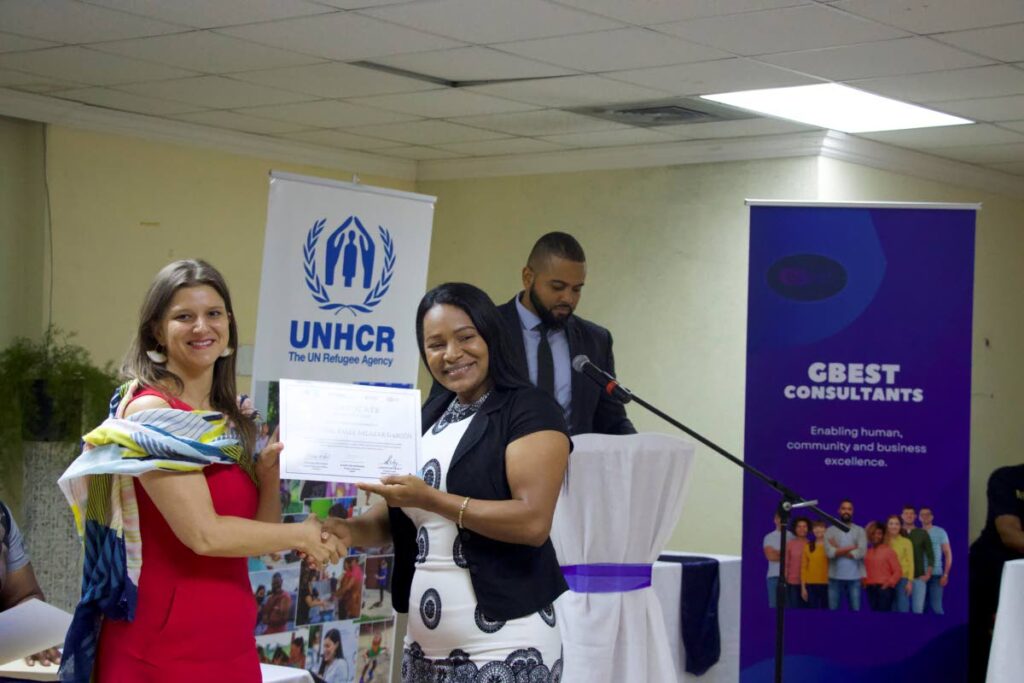Refugees, migrants get business training

Nineteen refugees, migrants, and nationals living in Chaguanas have completed a seven-week business planning and development course organised by the Pan American Development Foundation (PADF) and the UN Refugee Agency (UNHCR) and funded by the European Union (EU).
Under the Inclusive Cities, Communities of Solidarity project, the course, which started in April provided the participants with innovative business skills, knowledge and resources needed to strengthen their access to viable economic opportunities and networks. The course will also grant participants the opportunity to access competitive seed capital funding to support the launch or growth of their small business ventures related to health and fitness, cosmetology, food and beverage, handmade jewellery, and accessories, appliance repair, and event management.
EU ambassador to TT Peter Cavendish said in a release, “The Venezuelan refugee crisis is the largest displacement of people in Latin America’s history, with more than seven million persons fleeing that country’s political and economic instability.
"The EU has committed to stand with the people of Venezuela, working with partners to not only find a peaceful solution to the crisis but also to meet the needs of those displaced and ensure their socio-economic integration.
"I therefore thank PADF, UNHCR, Mayor Faaiq Mohammed, and all the other stakeholders involved for working with us to help Venezuelan migrants and refugees and the people of Chaguanas – their host community – to remain self-sufficient and independent."
Cavendish congratulated all who contributed to the project’s successful conclusion and for a job well done.
"Entrepreneurs are the dreamers that do, and by doing it, they help themselves and make our society richer,” he said.
The course, which was delivered by the GBest Trading Company Ltd business experts and educators’ bilingual team (English and Spanish), addressed needs and gaps shared by aspiring entrepreneurs, such as the entrepreneurial mindset, value proposition, innovation, financial management, marketing strategies, business communications, and negotiation.
Each participant received tailored mentorship to support the development of personalised business plans to guide their analysis of local market conditions and develop feasible, relevant, and sustainable business plans.

Commenting on the workshop, participant Kevin Paul said, “This business development training and coaching workshop allowed our business to become more innovative, entrepreneurial, and competitive, which can create value and generate high-quality, rewarding opportunities. Utilising a business development plan allows us to make tangible progress in sustainability and the success of our business.”
All trainees expressed a keen interest in improving the diversity and quality of services offered to the local community in different business sectors.
UNHCR head of national office Miriam Aertker said, “Economic inclusion and self-reliance are key to unlocking sustainable solutions for refugees and asylum-seekers. It supports integration in local communities and helps build strong foundations for lasting solutions – whether they eventually return home, settle in the country, or relocate elsewhere. I want to commend all the efforts of this cohort for their hard work, and I am looking forward to learning more about these growing businesses.”
UNHCR, PADF and GBest will organise a competitive evaluation of the trainees’ business plans, and continuous guidance will be provided to those businesses selected for seed capital funding.
Programme manager, PADF Hannah Katwaroo said, “Creating opportunities that support the start-up and expansion of profitable small business ventures among refugees, migrants, and local community members can positively diversify and transform the local economy.
"Throughout the training programme, all trainees were eager to design and operate relevant businesses that are responsive to our local communities' needs.
"Therefore, a great measure of commitment and careful thought was placed into this learning process, and we expect to witness the results of increased business activities, progress and inclusion among these aspiring entrepreneurs over the next few months.”

Comments
"Refugees, migrants get business training"